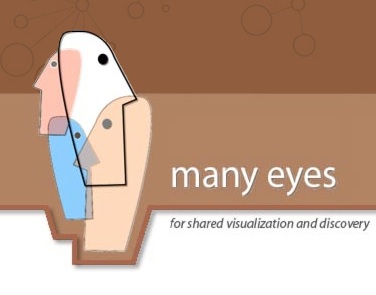2007-02-19: "Many Eyes": New web application for shared visualization and discovery by Martin Wattenberg et al.

Many Eyes is a brand new web application by a couple of well known researchers of the Collaborative User Experience group at IBM: Martin Wattenberg, Fernanda Viegas, Frank van Ham, Jesse Kriss, and Matt McKeon. Many Eyes combines a data library where you can upload your own datasets or use data of others with an easy to use visualization toolkit that features 13 different visualization types: World map, US Map, Line graph, Stack graph, Stack Graph for Categories, Bar chart, Block histogram, Bubble chart, Scatterplot, Network Diagram, Pie chart, Treemap, Change Treemap. The created visualizations can be viewed and discussed by everyone.
All of us in CUE's Visual Communication Lab are passionate about the potential of data visualization to spark insight. It is that magical moment we live for: an unwieldy, unyielding data set is transformed into an image on the screen, and suddenly the user can perceive an unexpected pattern. As visualization designers we have witnessed and experienced many of those wondrous sparks. But in recent years, we have become acutely aware that the visualizations and the sparks they generate, take on new value in a social setting. Visualization is a catalyst for discussion and collective insight about data.
We all deal with data that we'd like to understand better. It may be as straightforward as a sales spreadsheet or fantasy football stats chart, or as vague as a cluttered email inbox. But a remarkable amount of it has social meaning beyond ourselves. When we share it and discuss it, we understand it in new ways.

Many Eyes URL: http://services.alphaworks.ibm.com/manyeyes/app
Related Links:
- Review: Swivel vs. Many Eyes by Robert Kosara
- Many Eyes can be better than two Comment by Stephen Few
References
[Many Eyes, 2007] Many Eyes, About Many Eyes, retrieved at: February 19, 2007. http://services.alphaworks.ibm.com/manyeyes/page/About_Many_Eyes.html